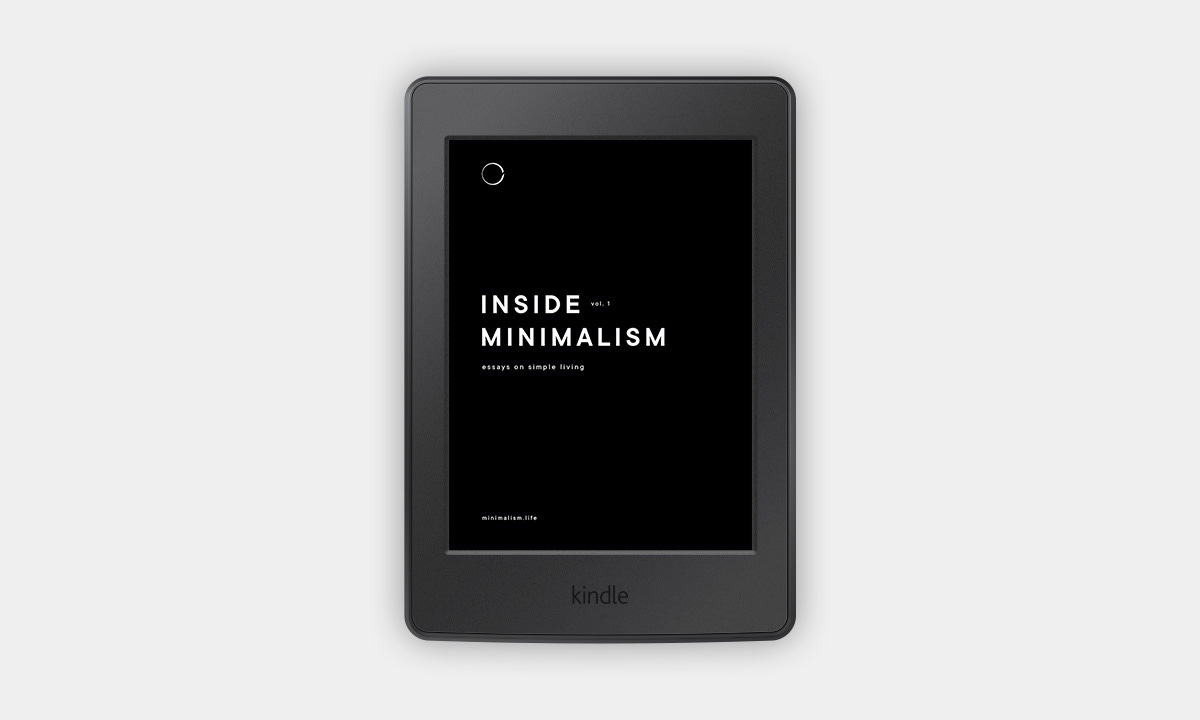“Compassion is the key to understanding others.”
Inside Minimalism, Vol. 1
Based on our exclusive subscription series, Inside Minimalism Vol.1 is a collection of 50 short and relatable essays on simple living by a small team of writers from different backgrounds, but who all share a deep appreciation for minimalism as a way of life. Enjoy a curated collection of beautiful writing with a single one-off purchase and support independent creators.
The Power of Representation in Minimalism
Words by Pierre Monnerville
I've always been a minimalist but never felt comfortable calling myself one. It's only been a month since I’ve allowed myself to talk about it so openly. Looking back, I first discovered minimalism at age six. I was a neglected child, so I spent an awful lot of time on my own. Even though my room was full of toys, I realised that toys never brought me happiness. They just prevented me from being too bored.
The reason I didn't dare label myself a minimalist was that most of the YouTubers and bloggers I was aware of were quite extreme minimalists. They were also either white or Southeast Asian, so as a Black man, I thought I just didn't belong there. Especially considering I have more than 4four plates at home and—shock, horror—dozens of novels and design, art, and photography books, which in my opinion are everything but clutter. You see, the thing is they don't just bring me joy and make me feel mildly clever and cultured, I actually go through them regularly when I look for inspiration for artistic projects. I absolutely love reading on my iPad, but to me, there is something very special about looking at art and design in a physical book. But I digress . . .
Stumbling across a blog by fellow Black minimalists a few weeks ago literally changed my life. I still can’t believe how liberating it was. Without even contacting any of them, my sense of isolation instantly vanished. That was just the beginning, though.
I launched a menswear label earlier this year. Yes, I design minimalist clothes. Obviously . . . What else could I do, right? However, I spent most of this year trying to explain to regular menswear aficionados what a capsule wardrobe was, trying to justify how critical—and beneficial—reducing consumption was and all the rest of it. Even worse, I felt obliged to pretend I was interested in fashion trends. Needless to say, I constantly felt a knot in my stomach and resented every single workday since I believed I couldn’t be true to myself. Then I blamed myself for not finding the right arguments and was overcome by shame and a sense of failure.
Now I feel deep in my core that I've finally found my tribe and can stop feeling like a fraud. Minimalism helps me focus on what matters to me, and I've come to terms with the fact that what I’m doing isn’t for everyone, even minimalists. Nevertheless, most of us understand the benefit of good-quality basic clothes with the right balance of discreet details.
Minimalism is no magic pill, however. My life hasn’t turned into a fairy tale just yet, but the fog has definitely lifted. I’m very grateful to be able to freely connect all the dots of my life and allow myself to be authentic.
Impulse Purchases and the Benefits of Retroactive Intentionality
Words by Shawn Mihalik
A month ago, I bought an expensive camera. I’m not going to lie: it was an impulsive purchase. I hadn’t planned for it. I hadn’t budgeted for it. A model-and-photographer friend of mine was in town, and after using her camera on a hike one afternoon, I just had to have my own.
It’s easy to make impulsive purchases like this; that’s why they’re called impulsive. We see people do it all the time: smartphone upgrades, televisions, other gadgets, even food—we often buy things like these mindlessly, without intentionally considering the purchase before we make it. But after a few weeks, days, or even hours, the excitement wears off, and we forget all about our shiny new toy.
But what if we didn’t forget? What if, after recognizing and acknowledging the impulsiveness of our purchase, we made a commitment to extracting maximum value from our new thing? Just because we weren’t intentional before we bought a thing doesn’t mean we can’t be intentional with that thing at all.
Ever since purchasing that camera, I’ve been deep in the rabbit hole of photography. I did a professional photo shoot with my model friend the very day I bought it. I began to build a photography portfolio on my website. I read the camera’s manual cover to cover. I read Susan Sontag’s On Photography. In the last month, I’ve watched dozens of video essays about photography on YouTube. And, most importantly, I’ve been taking photos. _A lot _of photos. Photos of people, of places. I shot engagement photos for my father-in-law and his fiancée. I’ve taken the camera with me to the coast, to the rainforest. I’ve started approaching people on the street asking to take their portrait—a big deal for me as a socially awkward introvert. I’ve committed to using my impulse purchase as a means of professional and personal growth.
Next time you make an impulsive purchase, after you’ve acknowledged the impulsivity, ask yourself: Now that I have this thing I might otherwise not have bought, how can I extract maximal value from it?
If you impulse-buy a computer, commit to creating something brilliant with it—write a novel, or learn to edit videos for that YouTube channel you’ve been thinking about creating.
If you impulse-buy a giant high-definition television, commit to watching great films with your family on that television.
If you impulse-buy a muffin, decide you’re going to enjoy the muffin. Savor the hell out of that muffin.
If you impulse-buy a book, read the book. Better yet, take notes on what you read, and put any lessons you identify into practice in your own life. I impulse-purchase books a lot. In fact, if there’s any item I’d come close to actually recommending you impulse-buy, it’s books—as long as you read the damn book.
Even the most perfect minimalist is going to make impulsive purchases every once in a while. By committing to the purchase after you’ve made it, you’re ensuring that your money—and the time you spent earning that money—is not going to waste. You’re also practicing—because retroactive intentionally is still intentionality, and over time, that intentionality will begin to happen before you make a purchase. You’ll start to recognize the value of a purchase before you make it, and the purchases that don’t have value, you might eventually not make at all.
A Little More of Less
A few other articles we think you might enjoy…
→ Organizing Is Easier After Minimizing by Joshua Becker
→ The Cycle of Minimalism by Emily McDermott
→ Simplifying Our Mental View by Leo Babauta
Do you have an interesting story you would like to share on Minimalism Life? We want to hear it. Click here to get involved.




